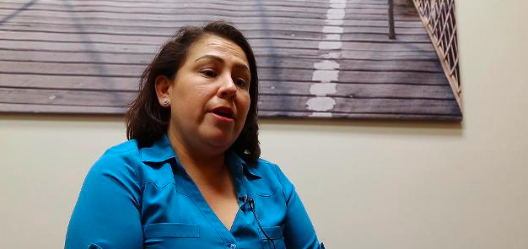
Each year, thousands of couples seek fertility treatment in hopes of starting a family, and many more choose to freeze their fertilized embryos to plan for the future. But the question over what happens to those fertilized embryos when a couple decides to part ways can be delicate and emotional (to say the least). Last week, the Arizona Supreme Court saw that play out firsthand, when it ruled against a woman seeking custody of her frozen embryos following a divorce. Ruby Torres, 39, was not only denied her request, but was ordered to donate them, according to CNN.
Torres made the decision to fertilize and store her eggs in 2014, before undergoing treatment for a bout with cancer.
She made the decision with her then-fiancé, John Joseph Terrell, and the pair signed an agreement at the fertility clinic stating that if they ever split up, the embryos would be dealt with in one of two ways: Either they would be donated to another couple looking to have a child or used by one of them to have children.
If they went with the latter route, however, it could only be with the "express, written consent of both parties."
The couple married just days after signing the papers, and moved forward with in vitro fertilization before storing the embryos for later use.
Fast-forward three years, and the couple suddenly found themselves embroiled in a bitter divorce. By then, Torres had undergone chemotherapy, and in the process, she endured a "significant drop in her reproductive function," according to court documents obtained by CNN.
Suddenly, it became clear that the embryos might be her only chance at conceiving a child on her own.
But her ex was now on a much different page.
Following their divorce, Terrell no longer wanted to father a child with Torres, and preferred that the embryos be donated to another couple in need.
The court case has been batted around quite a bit in the last three years — so much so, that it's been hard to keep up with which side is truly "winning."
When the case first hit family court, a judge ruled in Terrell's favor.
The court found that Terrell's "right to not be compelled to be a parent outweighs [Torres'] right to procreate and desire to have a biologically related child."
Torres, however, wasn't about to let the matter drop. She took it to an appeals court, which overturned the initial decision and ruled in her favor.
But on Thursday, Arizona's supreme court upheld the initial ruling, which has left Torres devastated.
The ruling didn't come lightly, though. Five justices presided over the case, and in their opinion, they noted that the court was "cognizant of the unavoidable emotional fallout" the ruling would cause. Ultimately, though, they referred back to the terms of the original contract that the couple signed, noting that because an agreement between both parties could not be reached, "the court could only direct donation of the embryos."
"These are extremely difficult and emotional issues, so it's best for couples to make decisions ahead of time," Eric M. Fraser, Terrell's lawyer, told CNN in a statement.
When Torres initially asked Terrell to serve as the sperm donor for her embryos, he declined, according to AZ Central.
Eventually, though, he agreed, and both he and Torres checked a box on the agreement that left open "the option of one party using the embryos if both agreed at the time their relationship ended and directed donation of the embryos if an agreement could not be reached," stated the court opinion, which was penned by Vice Chief Justice Ann Timmer. She made the ruling along with Justices Bill Montgomery, Andrew Gould, Clint Bolick, and John Lopez, AZ Central reported.
Still, that doesn't mean the fight is over if Torres doesn't want it to be.
A lawyer for Torres told ABC 25 Arizona that she is "devastated" by the latest court ruling, but will continue to fight for the chance to use the embryos to have children — even if that means taking the case all the way up to the U.S. Supreme Court.
Still, doing so will certainly be a costly endeavor. According to AZ Central, the Arizona Supreme Court declined to award Torres with attorney fees, which means she'll have to continue to foot the bill.
It seems cost is likely the least of Torres's concerns.
"This was my only opportunity to have a child," Torres told AZ Central in a 2017 interview, when the court battle began. "Prior to cancer, it was so important to go to school. I re-evaluated my life. I wanted an opportunity to have a child, to provide for them, to give them everything that I could in this world.
"Your right to have a child in the state of Arizona can be taken away by a judge," she continued, fighting back tears.




